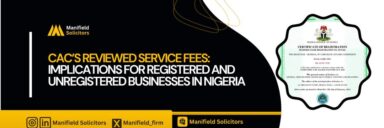On the 17th of June, 2025, the Corporate Affairs Commission (CAC) issued a public notice on the review of its service fees, which shall take effect from the 1st day of August 2025. The review, according to the Commission is aimed at improving service quality, ensuring operational sustainability, and enhancing digital service delivery through a cost-reflective pricing structure.
While the Commission assures that the adjustment is modest, competitive and aligns with its efforts to enhance service delivery, the revision carries broader implications for both registered and unregistered businesses in Nigeria.
IMPLICATIONS ON REGISTERED BUSINESSES
- Increased Compliance Costs
For existing businesses, particularly Small and Medium Enterprises (SMEs), the reviewed fees would result in higher operational costs for services such as filing annual returns, effecting changes to corporate records, change of name and obtaining certified documents. Therefore, businesses operating on lean margins may need to reassess their budgetary allocations for regulatory compliance.
- Incentive for Early Filings and Renewals
Businesses may be motivated to complete pending filings or make necessary corporate changes before the effective date to take advantage of the existing lower fees and to escape increased penalties. This has led to a short-term spike in activity within the Commission’s portal.
- Improved Service Delivery
The Commission, in line with the emphasis on digital transformation and prompt service delivery has upgraded its portal to an AI powered portal that can complete registrations in record time. It ensures that names suggested for reservations have higher chances of approval. Businesses will now benefit from faster turnaround times, reduced bureaucracy, and better access to corporate records offsetting, to some extent, reduced costs.
- Corporate Governance Pressure
The review increases the pressure on companies to ensure timely compliance, maintain proper documentation, and avoid penalties, thereby ultimately fostering improved corporate governance practices.
IMPLICATIONS ON UNREGISTERED BUSINESSES
- Increased Barriers to Formalization
The revision may deter some informal businesses particularly the same small and medium enterprises the Commission intends to formalize, from seeking formal registration when the cost of incorporation and related services becomes less affordable compared to their earnings. This could perpetuate informality and reduce the number of entities captured within the formal economy, because unregistered businesses often have limited access to opportunities and suffer from global compliance concerns, such as been flagged for terrorism financing, money laundering and fraud which deters potential investors and partners.
- Regulatory Pressure and Enforcement
On the other hand, improved funding through service fees may empower the Commission to increase compliance enforcement, potentially compelling more businesses to formalize to avoid sanctions or exclusion from government and corporate procurement opportunities.
- Digital Access to Services
With the CAC reaffirming its digital-first approach, compliance becomes faster and more accessible to SMEs as the usual delays occasioned by the former manual/online process are being eliminated, which could mitigate the deterrent effect of increased fees to some extent.
CONCLUSION
The Commission has stated that the revised fees were developed through stakeholder engagement, reflecting an attempt to balance economic sustainability with affordability. However, the practical implications on businesses will depend on how efficiently the Commission translates increased revenue into service improvements. For registered businesses, the focus should be on maximizing digital tools, staying ahead of compliance deadlines, and planning for new cost structures. While, unregistered businesses, especially in the informal sector, may need targeted sensitization and support, through fee waivers, simplified procedures, or government-backed incentives, to encourage formalization
While the Commission’s revised fee schedule is part of a broader modernisation agenda, it introduces new cost direction for businesses across the spectrum. Therefore, there has to be a balance between revenue generation and regulatory inclusion that is critical to ensuring that the policy enhances, rather than hinders, Nigeria’s corporate landscape. Registered and unregistered businesses must therefore take advantage of the limited timeline before the increase to update compliance obligations and prepare for regulatory changes.







Add your first comment to this post